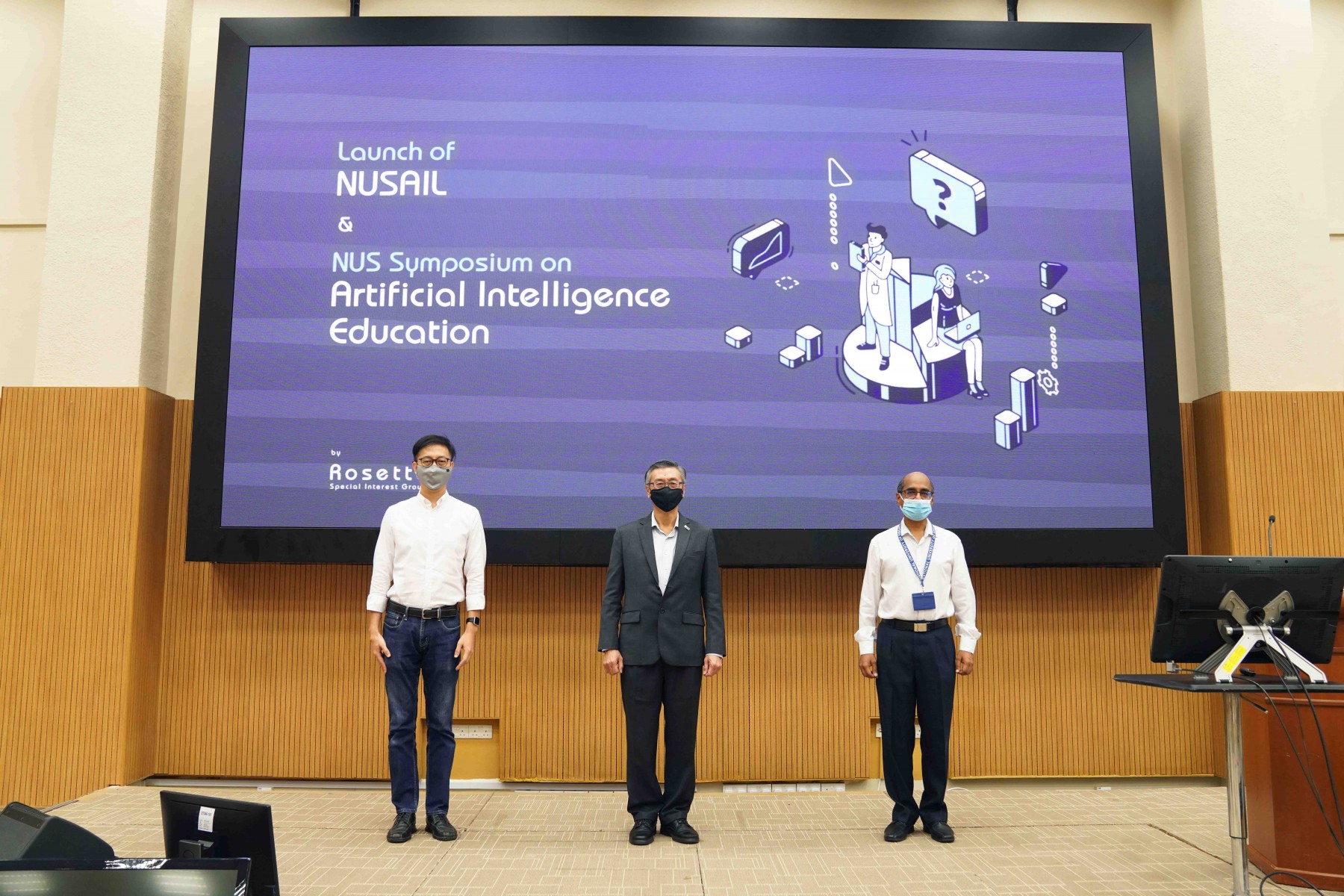A boost for AI research and education with NUSAIL and Rosetta
Research and collaboration in artificial intelligence (AI) has been given a shot in the arm with the official launch of the NUS Artificial Intelligence Laboratory (NUSAIL) on 21 February.
Hosted at NUS Computing, NUSAIL’s mission is to be a centre of excellence in AI research, education, and practice. Its members include faculty, staff and students from NUS Computing, as well as affiliated members from other faculties and organisations, both locally and internationally.
NUSAIL works on all AI areas with a focus on the three pillars of human-centred AI technology: embodied AI, interactive AI, and trustworthy AI.
“In the short period since the establishment of NUSAIL, it has laid strong foundations in its mission to be a centre of excellence in AI research, education, and practice, with a focus on human-centric AI that will empower people to work together with AI,” said NUS President Professor Tan Eng Chye, speaking at the launch.
“The work NUSAIL undertakes is critically relevant to NUS, as we have emerged as a global leader in AI research. For example, our Smart Nation Research Cluster has currently garnered S$1 billion in active research grants,” Prof Tan added.
Prof Tan noted that NUSAIL’s focus on human-centric AI, and its active research on responsible AI – incorporating social, ethical, governance and regulatory considerations – will enhance NUS’ ability to offer holistic and integrated solutions to the challenges and opportunities posed by AI.
In 2021, NUSAIL was awarded S$9.9 million in research grants by AI Singapore. The research grants will, over four years, support a broad spectrum of research on AI technology and their impact on people, such as computer vision, language processing, human-AI interaction, digital collaboration, interaction design and AI ethics.
NUSAIL Director Professor David Hsu noted that the laboratory started as a self-initiated effort among faculty members who taught AI at NUS Computing, and has received generous support from the School and the University.
“As a university research lab, we are constantly aware of our mission to educate the next generation to advance the future of AI technologies,” Prof Hsu said.
Programmes to promote AI research and collaboration
In conjunction with the official launch of NUSAIL, two programmes were announced under its aegis. The first is a research programme called “The Other Me”, which focuses on human-centric, integrated intelligence. A core component of the programme is the development of an AI assistant, which will be embedded in smart glasses to collaborate with a user on various tasks in daily life and work, such as assembling a bike bought online.
The AI assistant communicates with a user through natural language to understand the user’s goals and preferences, and works with the user to develop and execute the solution. It can see what the user sees from a first-person view to understand his/her actions and offer useful tips and just-in-time assistance.
The second programme is the iConnect membership programme, a collaboration between NUSAIL and SoC Industry Relations Office and which is aimed at promoting closer ties between industry partners and NUS Computing. iConnect is a membership-based industry affiliate programme which aims to accelerate the two-way exchange between researchers at NUSAIL and the local tech industry.
iConnect NUSAIL provides connections to the research and professional work of AI faculty and researchers at NUS Computing. The enhanced membership includes professional consultancy or lab visits hosted by AI faculty or researchers. Member companies can also access NUSAIL technical events and annual industry forums that showcase new ideas in AI research, as well as the latest innovations in AI technology that have a real-world impact.
Strengthening AI education
The event also saw the introduction of Rosetta, an initiative started by faculty members at NUS Computing. The special interest group brings together faculty members in NUS who teach AI courses in a spirit of dialogue and collaboration so as to leverage each other’s strengths and support each other in the field of AI education.
For a start, Rosetta is engaging in two new initiatives. The first is a module to teach the fundamentals of AI to students of varying backgrounds across NUS, so they can have the same starting point in their AI knowledge before specialising in their individual fields, while the second is a repository of complete AI, data science and analytics modules to allow the sharing of teaching materials, datasets, program codes and other resources both within and outside of NUS.
Rosetta is co-chaired by Dr Colin Tan from the Department of Computer Science and Dr Lek Hsiang Hui from the Department of Information Systems and Analytics.
An AI education symposium was held after the launch, where faculty members from across NUS shared their thoughts, strategies, and challenges in teaching courses in data science, analytics and artificial intelligence, through a series of talks and a panel discussion.
“With such a great proliferation of AI in many aspects of daily life, it is only expected that there is a wide availability of courses in the areas of AI, data science and analytics here in NUS, catered to students of different disciplines. As of January this year, there are well over a hundred such courses from almost every school and faculty here. This large number of courses is a very positive sign that our university is on the forefront of ensuring that our graduates remain relevant to industry and society needs,” said Dr Tan.






